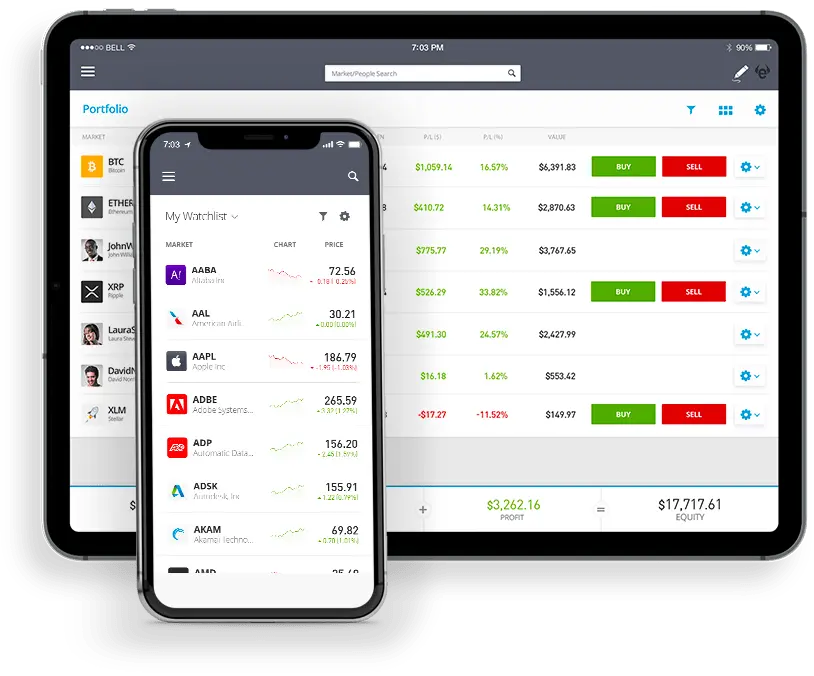eToro's demo account provides a simulated trading environment for users to practice trading without risking real money, whereas a real trading account involves actual investments and potential real-world gains or losses.
Open Demo Account!
61% of retail investor accounts lose money when trading CFDs with this provider. You should consider whether you can afford to take the high risk of losing your money.
Introduction
Navigating the world of online trading can be daunting. eToro, a leading platform, offers both demo and real money trading accounts. But how do they differ? Drawing from my own experiences, expert insights, and community feedback, let's explore.
My Journey with eToro
As someone who's dabbled with both the eToro demo account and real account, I've noticed distinct differences. The demo account was my sandbox, a risk-free environment. Transitioning to a real account, the stakes felt real, and emotions ran higher.
Key Differences at a Glance
This table provides a clear comparison between eToro's demo and real money trading accounts, highlighting the key differences and similarities.
Difference between eToro's demo account and real money trading account| Features | eToro Demo Account | eToro Real Money Trading Account |
| Initial Funds | Virtual funds (e.g., $100,000 virtual money) | Deposited real money |
| Market Access | Access to live markets | Access to live markets |
| Trading Experience | Risk-free, no real money involved | Real money at stake, real profits and losses |
| Emotional Involvement | Lower emotional involvement due to virtual funds | High emotional involvement due to real money |
| Order Execution | Simulated order execution | Real-time order execution with potential slippage |
| Available Assets | All assets available for practice | All assets available for real trading |
| Account Management | No need for identity verification | Requires identity verification, tax documentation |
| Withdrawals/Deposits | Not applicable | Real money deposits and withdrawals |
| Customer Support | Limited support | Full customer support |
| Learning and Tutorials | Access to educational resources | Access to educational resources and webinars |
| Emotional & Psychological Factors | Limited emotional impact | Real emotions due to potential profit/loss |
| Duration of Use | Unlimited usage | As long as the account is funded and active |
Community Insights
Jane, an eToro community member, shares, "The demo account was a great learning tool. But nothing prepares you for the adrenaline of real trading. The emotional aspect is something the demo can't replicate."
Expert's Perspective
Dr. Alexander Elder, a trading expert, opines, "Demo accounts are essential for mastering the technical aspects. However, real trading is both an art and science, where psychological factors play a significant role."
Challenges & Solutions
Transitioning from demo to real trading isn't always smooth. Here are common challenges and tips to overcome them:
Emotional Overwhelm: Real money can intensify emotions.
Tip: Start with small investments to acclimatize.
Overconfidence: Success in demo trading doesn't guarantee real-world success.
Tip: Always research and never invest based solely on past demo successes. You can take advantage of the eToro Academy and other available learning resources..
For those specifically wondering, "How does an eToro demo account differ from a real money trading account?", the key lies in understanding the psychological shift, the real-world implications of trades, and the nuances of live market dynamics.
Conclusion
While eToro's demo account offers a fantastic learning platform, the real money trading account is where theory meets practice. It's essential to be prepared, both technically and emotionally, for the transition.
eToro is a multi-asset platform which offers both investing in stocks and cryptoassets, as well as trading CFDs.
Please note that CFDs are complex instruments and come with a high risk of losing money rapidly due to leverage. 61% of retail investor accounts lose money when trading CFDs with this provider. You should consider whether you understand how CFDs work, and whether you can afford to take the high risk of losing your money.
This communication is intended for information and educational purposes only and should not be considered investment advice or investment recommendation. Past performance is not an indication of future results.
Copy Trading does not amount to investment advice. The value of your investments may go up or down. Your capital is at risk.
Don’t invest unless you’re prepared to lose all the money you invest. This is a high-risk investment and you should not expect to be protected if something goes wrong. Take 2 mins to learn more.
Crypto investments are risky and may not suit retail investors; you could lose your entire investment. Understand the risks here https://etoro.tw/3PI44nZ.
eToro USA LLC does not offer CFDs and makes no representation and assumes no liability as to the accuracy or completeness of the content of this publication, which has been prepared by our partner utilizing publicly available non-entity specific information about eToro.


